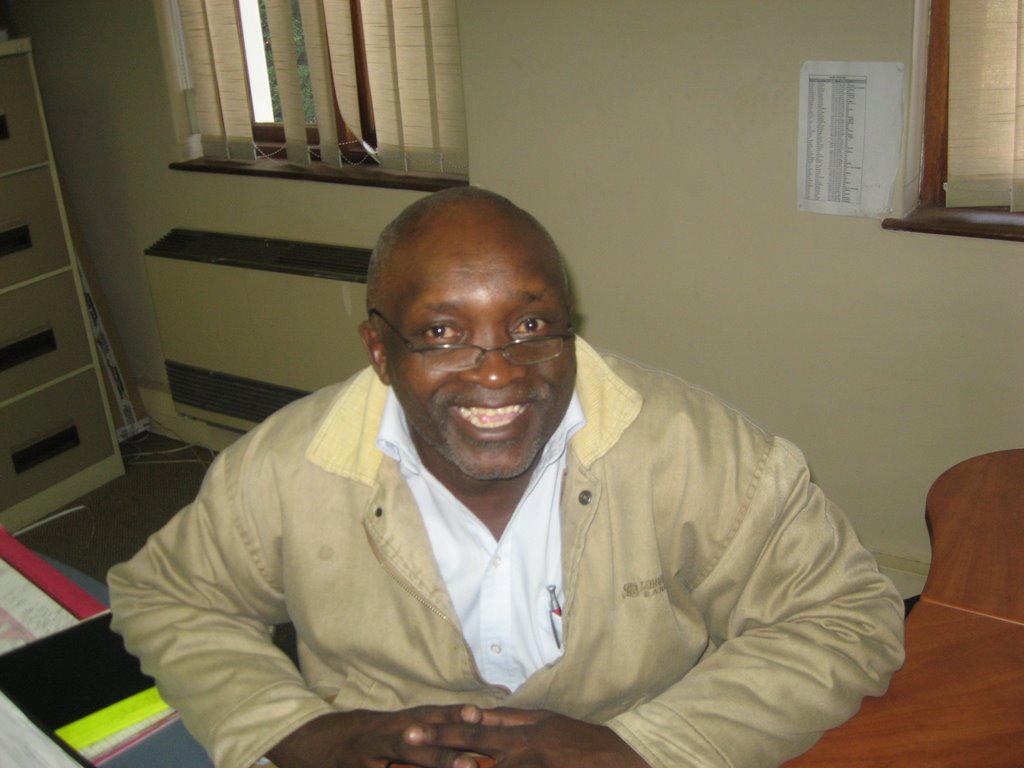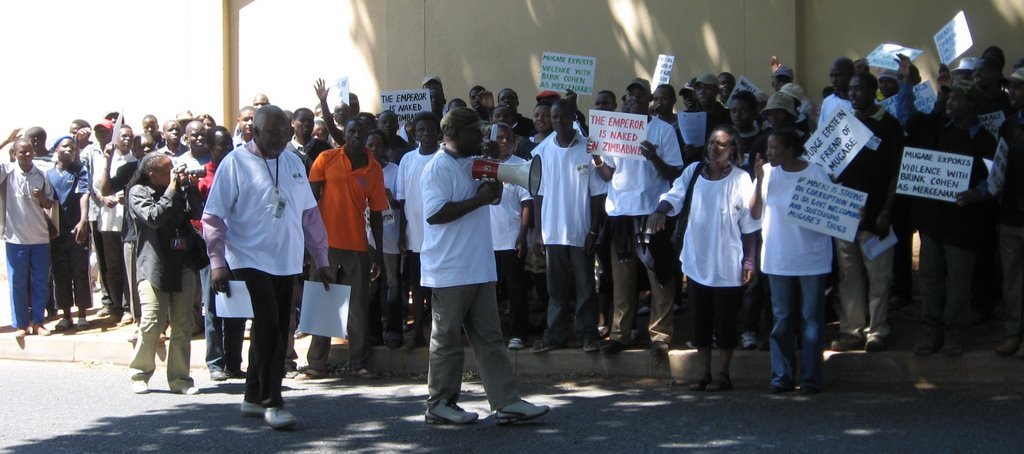Zimbabwe: What next?
Mon, 30 Apr 2007 00:05:00
In the count down to the 27th birthday of Zimbabwe, we have no choice but to continue to reflect on the meaning of independence and the destiny of Zimbabwe.
Ultimately life is a nuisance of time but in a nation's life every minute counts because nations do not expire like natural persons. The history of any nation is informed by the actions of each generation. Like a relay, one generation expects to inherit a legacy from another generation.
With respect to Zimbabwe
The world can go hang so says Zimbabwe
Last week was full of drama. For some the week started with great expectations that the SADC Summit was going to provide the answers they were yearning and working for. They waited in anticipation to President Mugabe's dressing down by his colleagues in SADC.
Some peddling the fragmentation of ZANU-PF into two distinct factions allegedly united of late in a resolve to replace President Mugabe.
Even the opposition parties invested emotionally in the outcome of the ZANU-PF Politburo and Central Committee meetings. In all, those opposed to President Mugabe were anxiously expecting the good news of the old man vanishing into the twilight and the red card being handed to him by both SADC and his own club.
On Friday, Mugabe was triumphant and yet no rational analysis is evident on why SADC would meet and arrive at the conclusion that the Zimbabwean crisis requires the western countries to back off by lifting sanctions and for Britain
The media and the international community i.e. Britain USA Australia Zimbabwe
In fact, the construction of the Zimbabwean problem is that Mugabe has to go for Zimbabwe
Having written on the subject of the seemingly inability of Mugabe's adversaries to read into the complex Zimbabwean condition, I have come to the inescapable conclusion that it is important that those who seek to unseat Mugabe must reflect deeply on their strategies and go back to the drawing board.
Why is it that SADC and ZANU-PF members do not seem to see what the opposition sees as critical to the resolution of the Zimbabwean crisis? Is the construction of the Zimbabwean problem in the minds of Mugabe's adversaries irrelevant and uninformed?
What sustains Mugabe? Why would allegations of factional fighting in ZANU-PF take a life of their own and yet Mugabe emerged at the end of the week fully in charge with no alleged faction electing to leave the party? Is it true that ZANU-PF is ridden with factional fighting whose leaders have no spine to stand their ground?
If Zimbabwe
Would the country agree with the MDC (both factions) that unless the country has a new constitution, a transitional authority to run the elections and a government of national unity, there will be no resolution to the crisis?
What would the country say to Mugabe's allegation that Zimbabwe Zimbabwe
It is important that in as much as people may find Mugabe's rule unacceptable, we reflect on why the message from his political adversaries has failed to capture the imagination of the regional governments.
Even President Chiluba and his former nemesis, President Kaunda, agree on one thing that the Zimbabwean crisis is externally engineered. Why would all these people be wrong on MDC ? Could it be that MDC is missing the point?
How justified is the allegation that MDC 's analytical and conceptual framework of the Zimbabwean problem is a Rhodesian Front construction that was wrong during the liberation struggle and is wrong now?
Even Ian Smith in boasting that majority rule was inconceivable in a 1,000 years failed to understand the true nature of the forces underpinning the liberation struggle.
Some people have argued alleged that notwithstanding the personal views that President Mbeki may hold on President Mugabe, he has no choice but to take the side that is consistent with the values that informed the liberation struggle.
On issues related to the interplay between race and politics, race and land, race and African transformation, the views of SADC heads of states are at one.
So where is MDC getting it wrong? This requires a new conversation informed by the experience of the party during the past seven years. Yes, MDC split into two real factions and yet ZANU-PF's alleged factions have not split from the party. Rather many people including highly placed intellectuals appear to speak on behalf of the so-called faction leaders i.e. Mujuru and Mnangagwa.
When Mnangagwa was challenged on the Tsholotsho plot, he did not stand up and yet people still believe that while Mugabe is in power he will have the courage of making a stand.
While no one knows what General Mujuru believes in, many have credited him for Vice President Mujuru's election by the party. No one has asked whether it is the case that Mujuru is indeed a king maker or he had nothing to do with his wife's rise to power.
Some have argued that the premise of the MDC argument has a lot of problems that make it difficult to mobilize support from African heads of state. Firstly, most of the African heads of state say that the starting point must be that the 2002 election is history.
On this construction, it is unreasonable for MDC to seek to reverse the election result that SADC endorsed as free and fair and expect SADC to reconsider a position that has already been made.
How then could MDC expect that SADC would take the position that Mugabe is not a legitimate President of Zimbabwe? With respect to the constitution, they argue rightly or wrongly that MDC is hypocritical on this question because Mugabe accommodated the push for a new constitution by appointing a Commission and conceded to a referendum whose outcome is well known.
Having gone the referendum route, they argue that it is unreasonable for the NCA and MDC to continue to agitate for a new constitution having failed to achieve the result they sought i.e. to remove Mugabe through the introduction of a new constitution.
On the question of a government of national unity, they argue that there is no precedent where a President having won an election can then accept to accommodate his opponents. If one accepts that Mugabe is a legitimate President of the country, they argue that it is unreasonable for MDC to expect him to accommodate them.
With respect to a transitional authority, they argue that Zimbabwe
With respect to the economic meltdown, they argue that MDC with the support of its international friends is responsible for the current state of the Zimbabwean economy by advocating the imposition of sanctions.
While acknowledging that the sanctions regime is generally acknowledged as ineffective is also argued that their existence gives Mugabe a convenient excuse to escape culpability.
Some would argue that Zimbabwe Zimbabwe
In as much as people may dismiss it as a convenient excuse, there are many who genuinely believe that the same forces that were opposed to majority rule are the same forces that are taking the lead against Mugabe.
If in 1960, Mugabe was not liked by the west and in 2007 he is still not liked by the west, then it means that nothing has changed and his party and country needs him to fully defeat the enduring enemy.
Why would bad policies not generate a negative response from the private sector? With an official exchange rate of US$1=Z$250 against a market rate of US$1=Z$25,000, why would exporters still remain in business unless they are playing by different rules? Why is it that the opposition has failed to attract the captains of industry to their ranks assuming that the regime change agenda is informed by the real interests of Zimbabweans?
It is true that President Mugabe has positioned himself as the champion of the common man and as the ultimate protector of Zimbabwean sovereignty. However, he boasts of a number of black victims including myself whose interests would not attract the attention of Bush and Blair.
In the circumstances, why would the opposition fail to articulate that any continuation of the status quo ante is necessarily harmful to the interests of not only white property owners but blacks as well who are being externalized in large numbers on a daily basis.
It is important that the true cost of bad governance is exposed and critically examined with a view to establishing whether Zimbabwe Zimbabwe sure ly it is up to the citizens of the country to speak loudly.
Some have argued whether President Mugabe truly enjoys the support of his party. They ask how many people would genuinely support President Mugabe if he ceased to be the President of the country.
They make the point that any regime change agenda must necessarily be funded and yet many of the western countries that engage in megaphone diplomacy have not put resources on the ground choosing to impose ineffective sanctions.
Can you imagine what would happen if the opposition has its own Gono? The role of the state in sustaining a party and leader who may have lost touch with the soul of the nation needs to be interrogated critically.
Finally, what is next for Zimbabwe
Does the end justify the means? Will the solution come from intransigence or from accommodation? Zimbabwe
What kind of emailer are you? Find out today - get a free analysis of your email personality. Take the quiz at the Yahoo! Mail Championship.













No comments:
Post a Comment